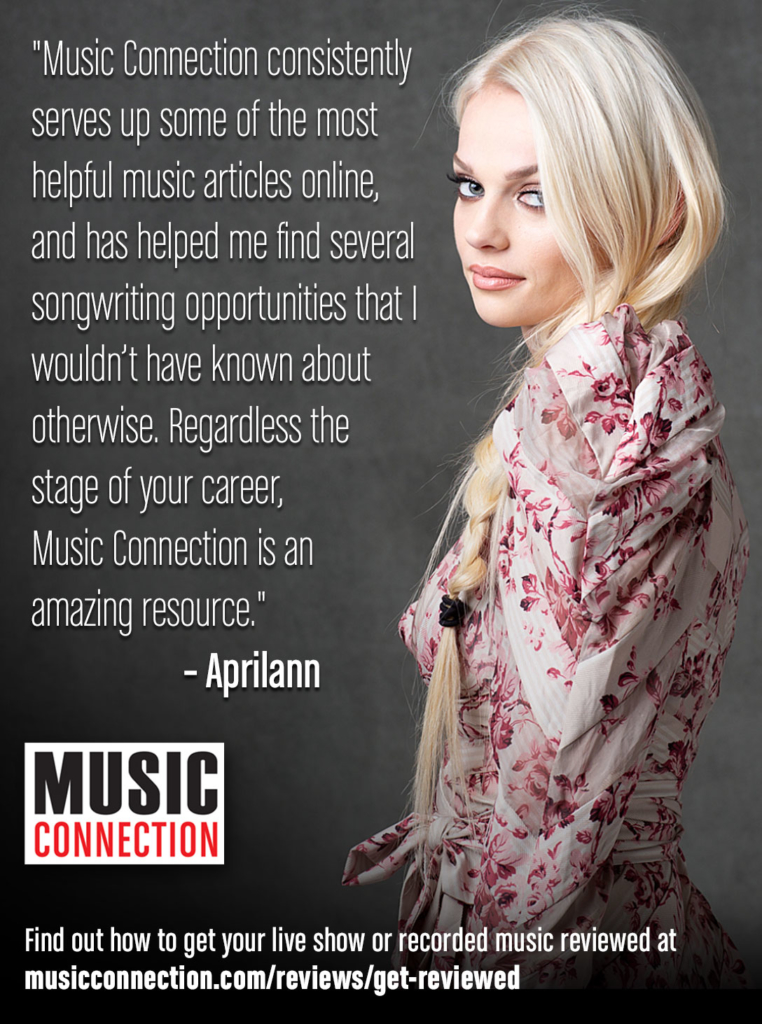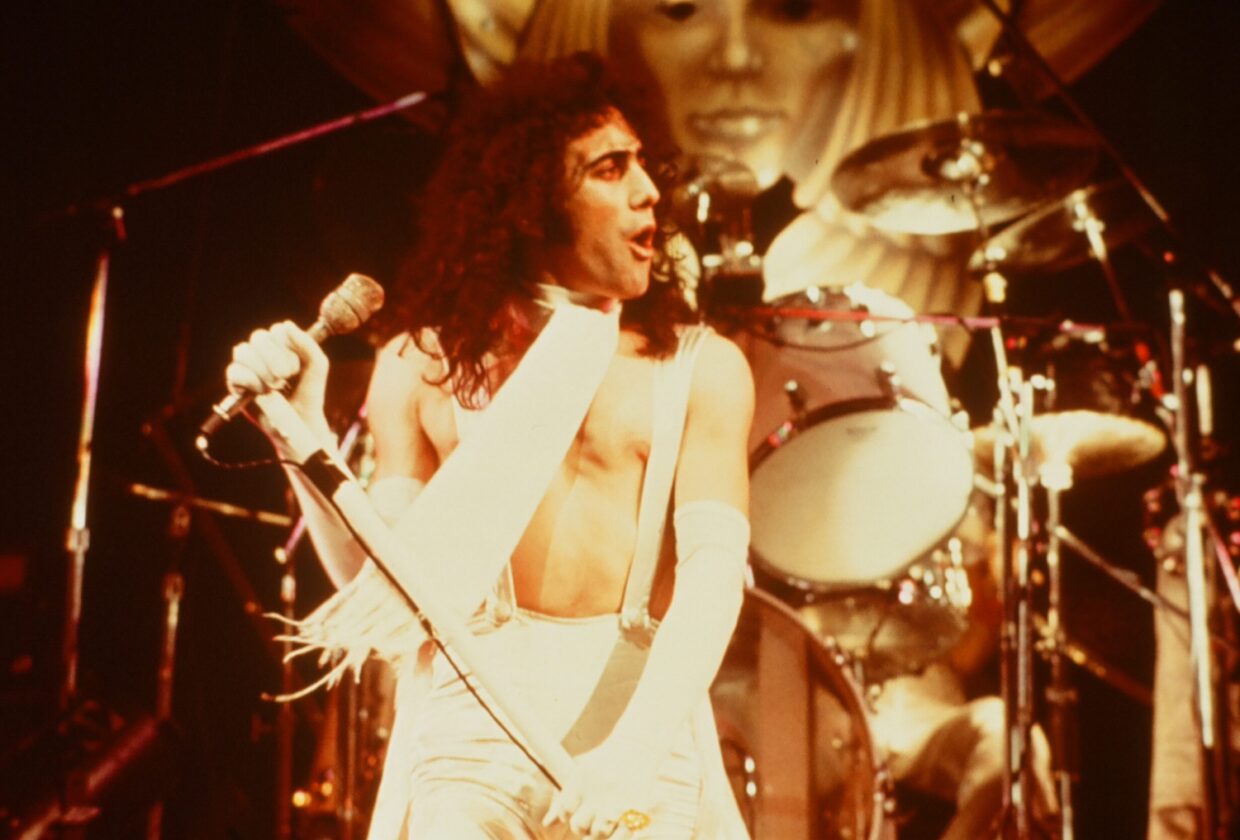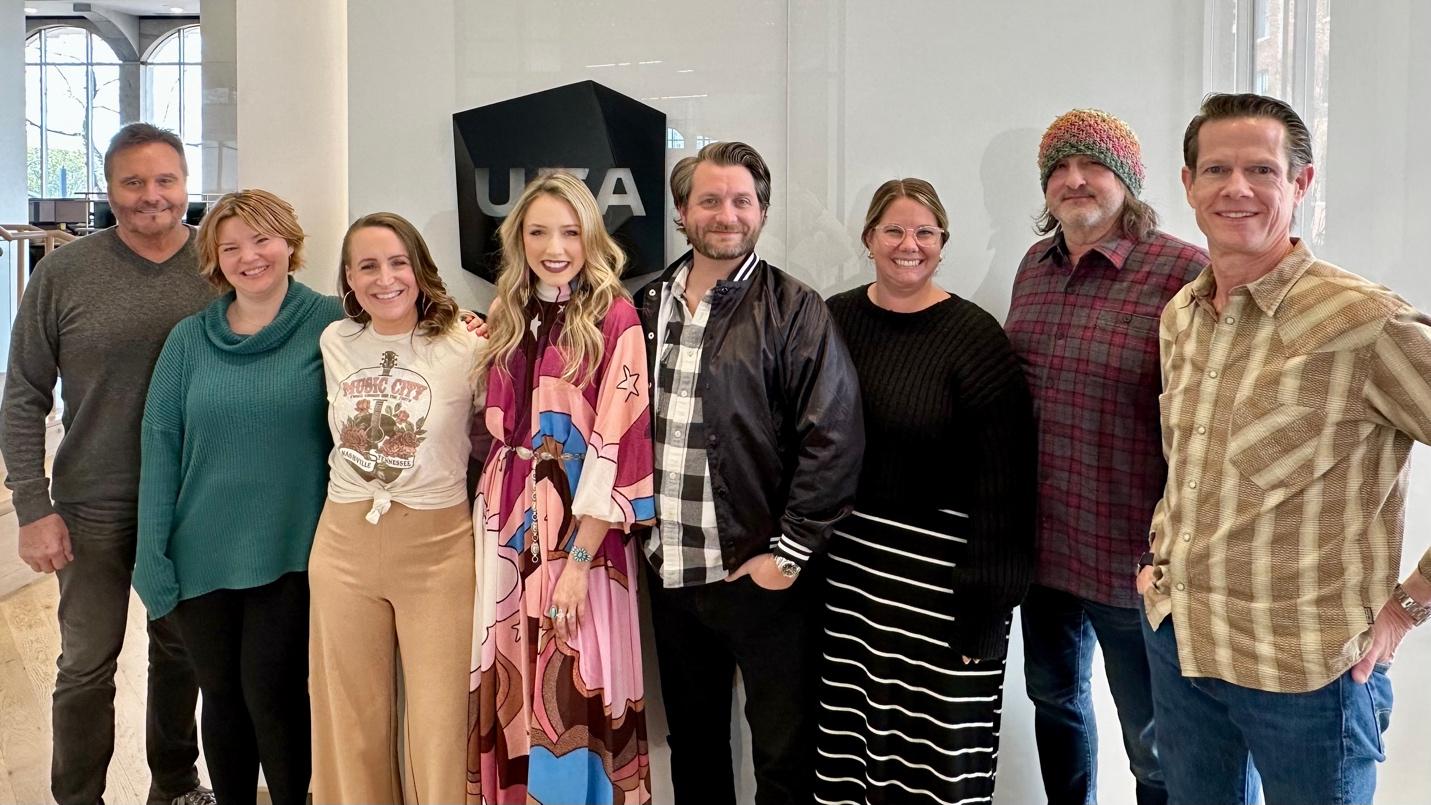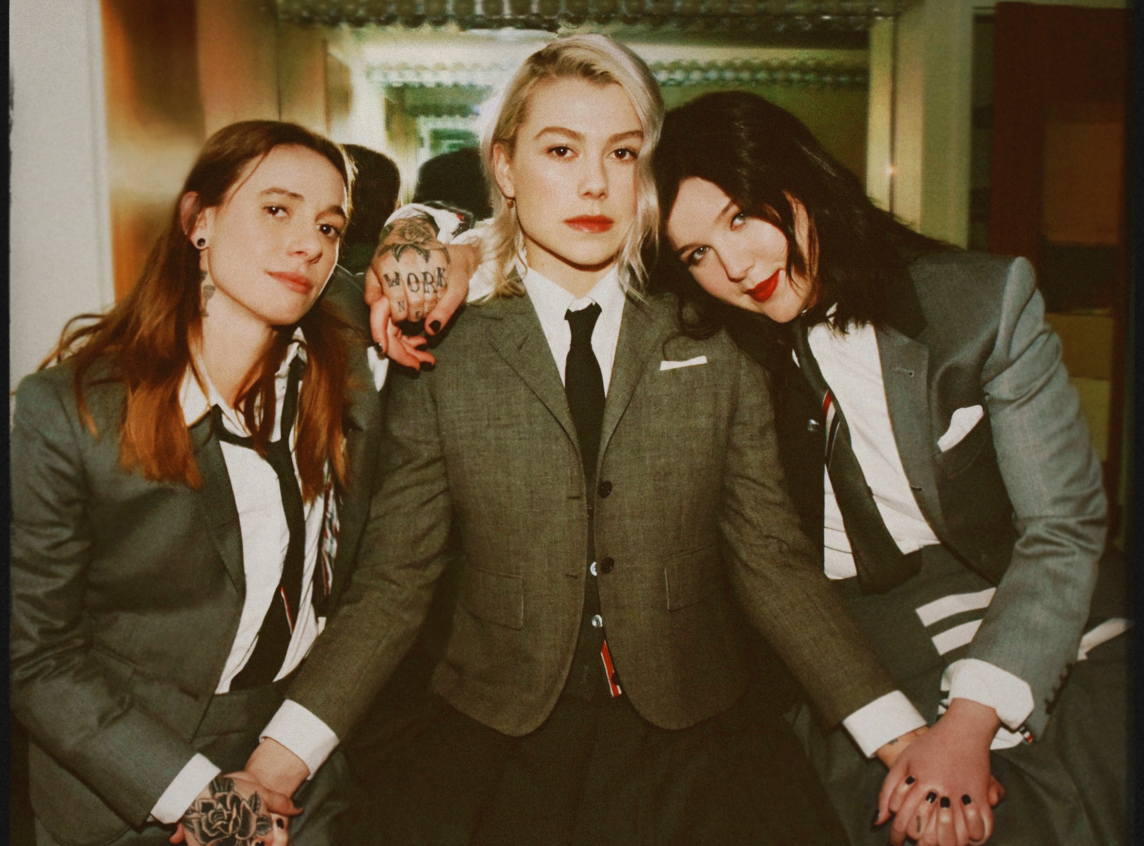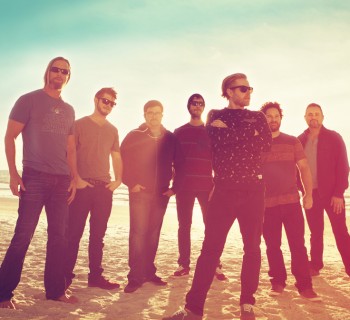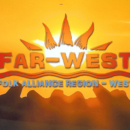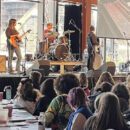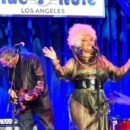On earth as it is in heaven, it’s a Saturday night, a group of Valley girls walk through the diffused, headlight-lit ‘70s tail-gating parking lot scene, as they approach the concert hall, L.A.’s famed Shrine Auditorium. Cut-to the inside, where it’s even more hazy, filled with cigarette and pot smoke, with lines of kids at merch tables and concessions stands. For the benefit of time our film jump-cuts past the Doug Henning-designed illusions, majestic Ben Hur music, and narration where our band is introduced and appears before our eyes in a poof of white smoke, right to the thumping bounce of a four-to-the-floor Giorgio Moroder/Keith Forsey-like rock disco beat, where they are all dressed in lavish white costumes singing the theme song (“20th Century Foxes”) to the movie they special guest star in, Foxes. I will never get this scene out of my head. If I didn’t already see them alongside Starz and KISS in my older brother’s Creem magazine, I would have thought they were a fictional movie band, like I thought of Sparks in Rollercoaster or Aerosmith as Future Villain Band in the Bee Gee’s Sgt. Pepper’s, or out of some Kroft Superstar Hour (Sid & Marty’s people designed their stage logo after all) Saturday morning variety show. If I didn’t have the gatefold Barry Levine-photographed (yes, same guy who did the Alive II and so many other iconic shots of KISS) live double album of Live Without a Net I wouldn’t believe my ears. Like KISS’ Alive! and Alive II, and Frampton’s Comes Alive, and Cheap Trick’s Budokan that live collection is not only one of the greatest souvenirs of a specific concert experience, but one of the greatest testaments to the zenith of ‘70s teen arena rock, and seriously one of the most underrated/unknown live rock albums ever put to wax. It’s a crime that it’s not heralded like those other celebrated platters. But such is the story of Angel, the Casablanca Records recording artists that fused the prog, glitter, pop, musical theater, and hard rock and roll of Styxx, Yes, Boston, ELO, Led Zeppelin, Aerosmith, and of course, KISS, and in a series of 6 albums (5 studio and said live album) they rocked legions of kids, wore Spandex and teased their hair to the sky, created hair/glam metal. If you saw the trailer for the upcoming Casablanca biopic you may have missed them, because they weren’t included. Nevertheless, Angel were on top of the world along with labelmates KISS, Donna Summer, Parliament, and the Village People. And then (for various reasons from mismanagement, lack of promotion, the critics stigma of being connected to Casablanca and KISS, or just being too ahead of their time) in a poof of a flashpot from their thrilling stage show, they were gone. Just when we thought we were doomed in the doldrums of a rock & roll wasteland, they’re back! Guitarist Punky Meadows and singer Frank DiMino have teamed up with their biggest fan, Danny Farrow, have rounded out the band Angel with some great young talent, and are back on the road to redemption. They have a new album out on Cleopatra Records on April 21, a documentary in the works with Deko Entertainment, and are appearing on a stage near you, including the legendary Whisky a Go Go on April 28.
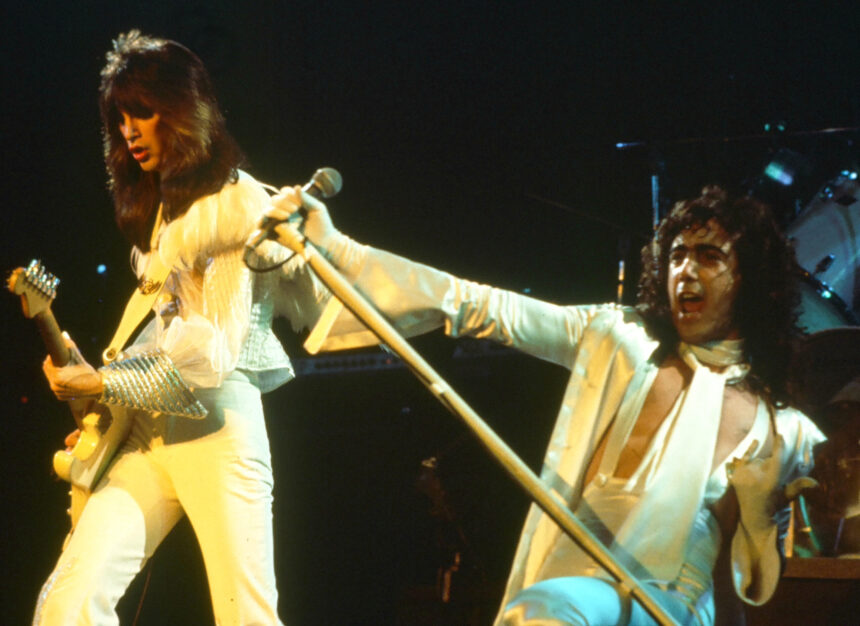
Music Connection: It seems congratulations are in order, your new album Once Upon a Time (released on April 21 on Cleopatra Records & Tapes) was #1 on Amazon’s CD & Vinyl Pre-orders list, and was also on their top Movers & Shakers list, which tracks their biggest “gainers” of the past 24 hours.
Punky Meadows: When Risen [their previous album] came out it did the same thing. It would be nice if we can get it into the 100 because that would be a game changer for us. It would help get bigger shows, too.
Frank DiMino: At this point it’s a whole different world from when we first started. To have a great response to what we are doing is a great feeling.
MC: Once Upon a Time…is the second release since 2019’s Risen, the long awaited “reunion” album. There must’ve been a lot pressure to rise (pun intended) to the occasion and deliver a new album that lives up to the classic catalog. But how do you do you do it again?
DiMino: A lot of the original Angel albums are different sounding, so I think the key here was to write songs that we felt good about, and hopefully the fans would go along with us. There were times back in the day where there was pressure to “do the same thing you did the last album.” But we were always moving forward musically and developing with each other musically. We never stayed in one kind of pocket.
Meadows: I’m really proud of this album. I never want to give people the same record over and over again. What I like about this alum is that it’s deep. It has everything that Angel fans expect: The epic songs like “The Torch” and power pop songs like “It’s Alright.” It’s got the hard rock and roll, but also songs like “Blood of my Blood [Bone of my Bone],” which is more of a soul kind of song. It’s very sophisticated and I wasn’t even sure if Angel could do that kind of song, but Frank did such an amazing job on it; as he did with “Let it Rain,” a song that when I first wrote it, I imagined Elton John singing, because it’s a beautiful ballad. But when I heard Frank’s vocal it was so good it brought a tear to my eye.
MC: Danny, you were an Angel fanatic and now a bandmate, you are in a unique position to collaborate with the band but also know what a “good” Angel song “should” sound like from a fan’s perspective.
Danny Farrow: You nailed it. When we work together it’s easier for me as a fan to step out of the box and say “what would I want to hear if Angel came back and I wasn’t a part of it.”
Song like “Turn the Record Over” or “It’s Alright,” I would write some of the choruses and say “wow, that really hits the Angel sound!” Then I would call Frank and Punky and work it out with them. When I came up with “The Torch” [opening track on new album] I was like “there’s not too many songs like ‘The Tower,’ you know those epic songs from those first two albums. One thing I wanted to bring back was the dueling solos between the keyboards and guitars.
MC: Punky, you mention Frank’s impressive vocals. His voice is spectacular, especially when compared to other legacy bands whose singers can’t deliver without backing tracks these days. And your guitar playing is on fire, your tone makes me feel stoned! How did you guys get better than ever?
Meadows: I hope that you put that in print! That’s really cool, that’s a compliment because it’s saying that my guitar playing is taking you somewhere else, which is cool. I like to let the solos breathe more. It’s what you do with the notes that is more impactful, more of a statement. I’m an emotional player, it’s all about feeling and soul. And I still love playing. Every night, it’s like sitting down with an old friend.
DiMino: Thank you. When I started teaching, I was doing all those exercises I used to do when I was taking lessons very young. Hopefully it helped and I think it kept me going for as long as I am now. I guess it’s technique.
MC: You’ve still got the showmanship, and flashy outfits too. Doing moves and posing like your larger-than-life photos. How important is it to you that to you maintain that pomp of a rock star?
Meadows: I always liked that, from back when was a kid and I first saw Elvis doing the gyrating thing. I loved watching Jimi Hendrix, and the Rolling Stones perform on stage. It looks so cool and it’s fun to do, but more importantly, if you’re going to be a rock star then be a rock star, don’t put a business suit on in the day time and then put your rock clothes at night; you have to be a rock star 24/7. Whenever I go anywhere out in public people know that I’m a musician. I always said that Keith Richards is always a rock star no matter what. He lives it. From Elvis to the Beatles to Frank Sinatra, it’s not just a music business, it’s an image business. That’s why the girls rule the charts these days, because they’re all fucking hot and wear great clothes, they look glamorous. And that’s what we did in the ‘70s. People who came to our concerts were all fucking chicks, because girls loved all that kind of stuff, and the guys followed the chicks. Today it's a bunch of goofy guys, or they look like they’re in prison; wearing baggy shorts and baggy shirts, or have big scary tattoos on their necks.
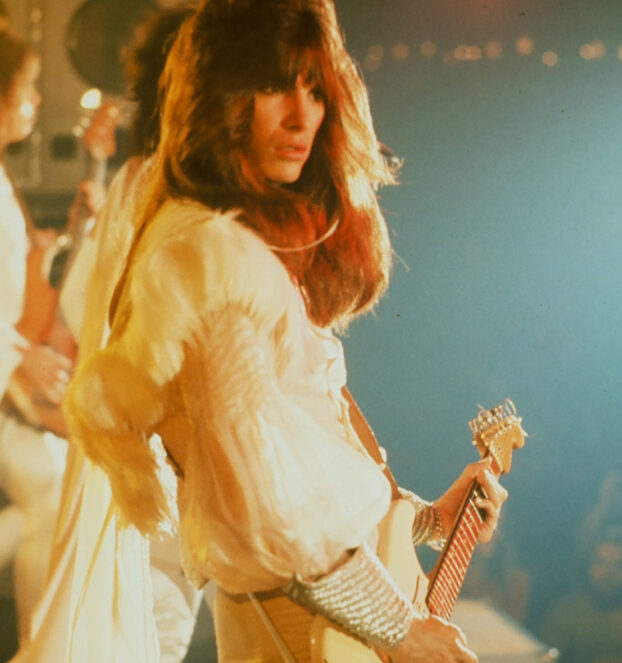
MC: Your makeup, big hair, and flashy outfits led to the glam metal/or hair metal era. What do you recall about that time, did you see your influence, and did you guys get testimonials from other bands?
DiMino: When you look at what we did, [inventing hair metal] wasn’t our intention but that’s what we were doing, yeah, absolutely. I do a lot of the Fantasy camps, and meeting up with the guys that I played with in the ‘70s and ‘80s was a good time to talk with each other, and there’s always been a lot of gratitude for us. it’s always nice to hear. Especially from the ‘80s guys that we were an influence on.
Meadows: We started the whole hair metal thing. Before that, people were pretty much playing in jeans and t-shirts. Of course, you had David Bowie and Mott The Hoople, and bands like that. But then bands like Queen, KISS, and us picked up on the whole glitter thing, then of course it evolved from that to the ‘80s hair metal scene. Marty Freidman came and saw me one time when I was a DJ and he came in and said he was a big fan. In fact he sent me a message because we were playing in Japan and he wanted to know if he could come on stage and play an Angel song. He said he knows all the Angel songs. Paul Gilbert is also a big Punky Meadows/Angel fan. There’s a picture of him all dressed in white, with hair like mine, holding up two Angel albums. And, of course, Nikki Sixx was a big fan. We used to rehearse at the same facility, SIR. I remember Vince and Tommy came inside the studio and they would punch each other on the shoulder like school kids, because I showed them how to play an Angel song, and they were all excited and impressed. I know that they were all inspired by it. We inspired a lot of people, but I didn’t realize that until many years later when Facebook came out.
MC: It’s kind of a shame that the band broke up before MTV, because bands like Styxx were making the transition from the ‘70s into the ‘80s. And you guys were really setting the stage for all those hair bands that were huge on MTV. It’s hard not to think “What if” Angel stuck it out, right?
Meadows: It’s all about timing, you know, Daniel? The thing is, when MTV came out every band was like Angel, and it all became hair metal and that whole thing, and, unfortunately, we weren’t around for that. I think if we had been on MTV it would have busted right open. It would have been a different story, we would be talking a whole different ballgame right now, because we were primed for that, but unfortunately the band split up just before that came in. That’s just the way things happen.
MC: I loved “1975” from Risen, and nostalgia for the glory days of the glam rock era. Do you miss those times?
Meadows: It was the golden age, it was huge. Music is what everything was about. It wasn’t about video games. It was the concerts, the whole rock scene. Everybody wanted to be a part of it and it was just so fucking cool. Everybody was able to express themselves and be different, and the music was so good. It was exciting, all the chicks and the dope, smoking joints. It was a party. It’s funny when you look back at it now, because it was such an innocent time, it gives me butterflies when I talk about it. Back then we had billboards for every Angel record that came out. Now they have movies. Back then rock stars were bigger than movie stars. Every movie star chick wanted the rock star boyfriend. If you walked out on the street with a guitar case all the girls dug you. Music was the coolest, hippest thing ever. And it was all so diverse, everyone had their own sound. Unfortunately, it kind of started to get where everything sounded the same in the ‘80s, with oversaturated guitars and everyone tapping like Eddie Van Halen. But in the ‘60s and ‘70s everything had its own sound: Styxx didn’t sounded anything like Blue Oyster Cult, Angel sounded nothing like KISS, and KISS sounded nothing like Cheap Trick. All these bands had their own sound their own styles. And that’s what made it so great and unique, you never got tired of anything because everything was different. And the musicians were so good too.
MC: I also love the lyrics on “It’s Alright” [the first single from Once Upon A Time]: “It’s been a long time, we’re back again, hope it never ends.” Frank, that line seems like a theme to the record, but it’s not about just being back as a band, are you also trying to evoke and bring back those glory days of rock and roll?
DiMino: Yeah, you know a lot of people say rock is dead. But rock is there, it’s never going to go away because it’s there. It’s just people have to point out where it is for them to find it, and enjoy it. Like when we do live shows, I tell everyone to forget about yesterday and tomorrow and enjoy what we’re doing now because we’re having a great experience. I want people to enjoy the band, enjoy themselves, enjoy the music and have a good time. That’s always been the case with Angel, we always wanted to present good songs and a good show.
MC: About the show, you guys once said that you wouldn’t do an Angel show again if you couldn’t do it with the big budget and big show. Can you talk about making an Angel show work on a smaller budget and scale?
DiMino: I don’t think the big show would work in the smaller places that we are playing. We use fog on “Fortune,” and maybe as we go forward we’ll add a few things here and there, but I don’t think we’ll be going back to the old Angel show where we have the disappearing and appearing and the big logo rising and talking to the audience any time soon. When we did that show it kind of ran by a stopwatch, certain things had to come up at a certain time. It was kind of nerve wracking, and there were a lot of people involved. Now, the main thing is playing. The one thing that you understand when you come to see the band now is that you really realize how much Punky and I enjoy playing our songs to an audience.
MC: Who do you see in the audience now?
DiMino: I see a lot of younger people now, people that never got a chance to see Angel live, especially over in Europe and the UK. We never played the UK before and it was great to see the mixture of people out there. I think we’re seeing the same thing out here. We did some shows with Starz, which was a lot of fun because we have a lot of history together, and those shows brought out a lot of people from back in the day and a lot of new kids as well.
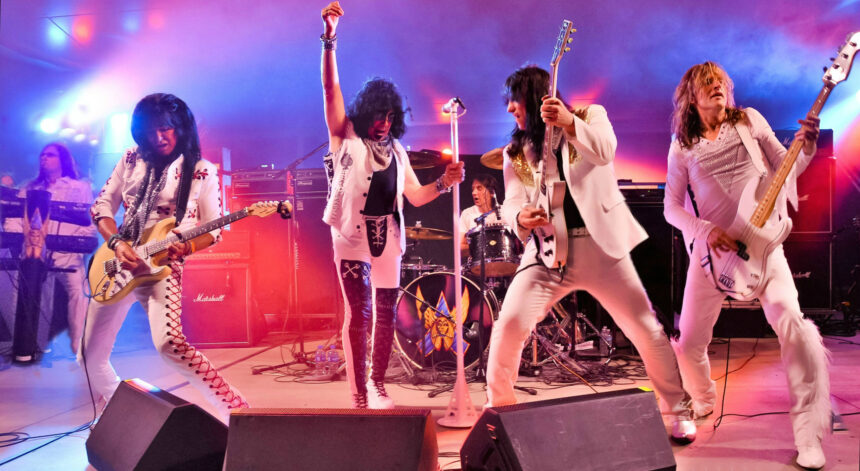
MC: Angel is in kind of a reverse Hot Tub Time Machine situation, a classic band in a new world. How do you navigate that world, where streams and clicks are as important as charts and sales?
DiMino: You are absolutely right. We always hear “you gotta get on Tik-Tok” and “you gotta get on this platform and that platform.” We just push forward. We try to do the things we know will work and we try to do the things we’ve done in the past. Hopefully some of it works, even though some of it won’t. You just try to be true to what you’re doing. It’s a matter of going out there and try to play to as many people as possible. That is one of the keys for us, to try to get to as many people as we possibly can. And it’s always a battle. The social media thing is a tough thing to negotiate. It’s like a time bomb sometimes, you have to do crazy things to get people aware that you’re even on it, and that’s not something that’s in our DNA.
Meadows: It’s changed a lot. Obviously streaming and stuff like that destroyed the music business. There were some down sides with the big record companies, but there were a lot of up sides to it too. I miss those days. I’d like to have a big company behind me, sticking behind a band through thick and thin. Neil Bogart was like that, he was a great cat. That’s just the nature of the beast. I just wish we could make music and have it be that the artist can make money doing it. People say music should be free and I say when you work for a living do you think your salary should be free? I mean c’mon. People have to make money. But the business has changed. Most of the money now is touring and playing. But we do pretty good on record sales.
MC: Are you paying attention to stream counts and things like that?
DiMino: Yeah, sure, you have to. It’s so different from when we first started, when the album drops it goes to Spotify, it goes to YouTube and we’re going, “What do you mean? Shouldn’t we wait until some of the sales come in before we go to a service like that? And they go “No, no, no, this is the way you do it.” So, we’re learning as we’re doing things and trying to figure out the right way and the right path to do it.
MC: You are signed to a pretty big label now. Tell us about the deal with Cleopatra Records that Danny hooked up?
Meadows: Cleopatra is a real good company. They’re kind of old-school in a way, you know, they get behind us if we need money for videos, they gave us a pretty good record advance, and they put the record out on gatefold vinyl, CD, and even cassette! When we first signed with Cleopatra it was a one-record deal, but when Covid hit we couldn’t tour, so we decided let’s do another album and see if Cleopatra were interested. Right away they were interested and they said “definitely.” I think they would do a third, too, because they liked Risen, and Once Upon A Time is starting to do well for them too. They are the ones who got us the album cover artist. They said we don’t mind spending money for a good album cover, because it’s collectable art work and more people will buy it because of the cover.
DiMino: The relationship is great. They’ve done everything that we’ve asked them to do, so they’ve been great to us. It’s true that they’ve also been generous. They let us do what we have to do artistically and we left marketing and a lot of the way they do things to them. We are close collaborators on how we released the album and who we went with for publicity. So yeah, this version of Angel and Cleopatra has been a great relationship so far, which I’m really happy about.
MC: The Casablanca Records biopic is coming out soon. You were there for all that ‘70s excess. What do want to share about Neil Bogart and those wild nights and crazy days?
DiMino: The Village People used to rehearse, working on dance routines, at the same place as us. Donna Summer’s band, Smoke, used to rehearse with us at this overdubbing studio that Casablanca owned. We were originally going to sign with Capitol but we decided against that. Our manager David Joseph from the Toby Organization asked, “what about Neil Bogart’s new label?” We brought our self-produced first album down to Neil’s office and he called everyone in and had someone roll up a big fat joint. A whole lot of food would come later, but first he put on the album, lit up the joint, and we sat there and listened to the whole album. Everyone was smoking this big fatty, and when it was over everyone was quiet, and Neil said, “Now that’s what I want to hear!” And that’s why we ended up signing with him. He was generous. He gave us what we wanted. He gave us recognition and told us that we had a great album.
Meadows: It’s true, Neil would always light up a joint, and he had a big bowl of cocaine out there too. It was just like that show Vinyl on HBO. He loved it, and then we would have after-parties after we would record something. He started off with nothing and became the Golden Boy of Hollywood. We were into him for a 1.5 million because he would give us tour support or whatever we needed. And the last conversation I had with him he said “I’m going to write this off, and you guys are going to win the war.” Then a couple months later he wound up getting fired for misappropriation of funds or something weird like that. After that happened Casablanca fell apart. We were still under contract, so we couldn’t to record with anybody else or get another record deal, and that’s kind of what broke Angel up, actually. We ended up splitting up because we couldn’t do anything under the name Angel.
MC: Can you talk about the ups and downs of that time? You had just done Live Without a Net, appeared in Foxes, and were playing arenas before it all came tumbling down.
DiMino: It was a very exciting time. We played two nights at the Budokan and two nights in Osaka when we did the Japanese tour. We came back and started headlining here, and then to go into do a movie with Jodie Foster was like “ok, we’re there! Everything is moving forward very nicely.” But like I said, things always have a way of evening out. The band always delivered, but when it came time for Casablanca to do things near the end it started to fall apart. We felt like we gave them everything they needed and they didn’t deliver.
Meadows: What happened was, we did Live Without a Net as Neil Bogart was nearing his end with Casablanca. He pretty much got the axe, unfortunately, because Neil really loved Angel and was behind us. The live album came out and it wasn’t really promoted the way it should have been. Without Neil there it was just a bunch of college kids working there. The live album just sat on somebody’s desk, I guess. It’s unfortunate because Angel was really progressing and growing as a band before it all ended. We were just getting better and better at it, you know?
MC: Do you think that there was other baggage that came along with Casablanca, like the stigma from snobby the rock-journo intelligentsia when it came to Neil Bogart and how they perceived KISS and all his promotional gimmicks?
DiMino: Absolutely, sure. Of course, they thought, “Oh, here comes another thing they’re gonna try to sell us.”
MC: Angel put on a huge show, even as openers, which created some problems. Can you talk about some of those bands you opened for?
Meadows: The problem with us is that when we would go on tour as a supporting act, we’d wind up getting thrown off the tour because we were blowing the headliners away. People would come to see the headliners, but then we’d come on and just rip the stage and people left talking about Angel. The headliners would always try to sabotage us. We were too much of a threat. We opened up for Roxy Music and they had no room up in front of the stage for us. I asked the guy if he would mind moving his saxophone stand a little and they wouldn’t do it. They wouldn’t move the damned saxophone stage because they hated us. We did four shows for Aerosmith that David Krebs got for us: The first night we were on stage and we had 5 Super Trouper spotlights on each guy. The second night we had four, the third night we had two and the last night we only had one. I asked David, how come they keep taking spotlights away from us, and he said “Listen, Punky, when you play with a headliner you play by the headliner’s rules and you’re blowing them away and they don’t like it.” What happened was, we were forced to headline prematurely in the Midwest where we were big, but those were places that were theaters, like 3,000 - 4000 seat theaters and we still couldn’t do our whole show. But the thing is, even if we only came out in all white, we were effective just like that. That was an effect itself that separated us from everybody else. All the kids would rush the stage and scream. We got kicked off most of the tours, except Styxx were cool, and Blue Oyster Cult and Rush were cool, too.
Meadows: It was a battle that I think we won every night. Most bands weren’t comfortable with us and why would they? The big thing is to get to play in front of a lot of people and that’s why you go through the hassle of opening up for bigger bands, because you want lot of people to see you. No matter if we had the full show or not, we were still a visual band, so it was key for us to play in front of a lot of people, but it was difficult as well.
MC: Obviously there’s been highs and lows, and now you’re back and still navigating through it all. Can you give our readers some cautionary tales, or some advice?
Meadows: We’ve parted ways with our recent manager, because that didn’t work out. You know, people asked where I was for all those years, and I say I love music but I hate the music industry. I hate the music business, because it’s just a bunch of sharks and people riding on your coattails and stealing everything you got. And it hasn’t changed. We had this other manager and he promised us all these things and he didn’t do anything, and in the meantime he was trying to take money from us. And he tried to do it in a sneaky way. I read an article with Steve Lukather where he said he doesn’t need a manager, all he needs is a good booking agent. We’re artists, we’re not really business people. I want to play stuff and create. I would just say watch, read everything, and if you are going to get a manager try to do it on a trial basis.
DiMino: Those are very hard things to figure out, because what happens usually, even with a producer sometimes, you don’t realize you made a wrong step until you made it. You gotta figure out how much of a commitment you are making to each thing you do, and if you do make a full commitment you gotta really feel comfortable with the person you are making a full commitment to, because there are always drawbacks to things, you have to understand that. It’s not always just because you like someone and just because you think it’s going to happen, it’s not always going to be roses and a great pathway to things. You gotta really soul search and do some diligence, fact finding, to figure out how much of a commitment to make to each thing/person.
Contact:
Billy James Glass Onyon PR
glassonyonpr@gmail.com
Visit angelbandofficial.com
Thanks to Casablanca’s Larry Harris and Ken Sharp for some additional info
